COPH live and in person at APHA annual conference
For the first time since 2019, the USF College of Public Health (COPH) attended the American Public Health Association’s (APHA) annual meeting in person.
COPH students, alumni, faculty, staff and others associated with the college were there to present research, attend symposiums, network with colleagues and develop professional skills.
The APHA is a professional association for those working in public health. Members work in every public health discipline, across all 50 states and around the globe.
The theme for this year’s meeting, which also pays tribute to the APHA’s 150th anniversary, was “150 Years of Creating the Healthiest Nation: Leading the Path Toward Equity.” The meeting was held in Boston from Nov. 6-9.

From panel discussions to presentations to parties, the COPH was a part of it all. Here, some of the highlights and happenings.
Appointments
Rafaella Stein Elger, a PhD student concentrating in community and family health, was named a maternal and child health section student fellow.
The program provides graduate-level students opportunities to learn about maternal child health (MCH) and the APHA, build professional networks and develop leadership skills. It also fosters the development of leaders in science, programs and policy related to the health of women, children and their families.
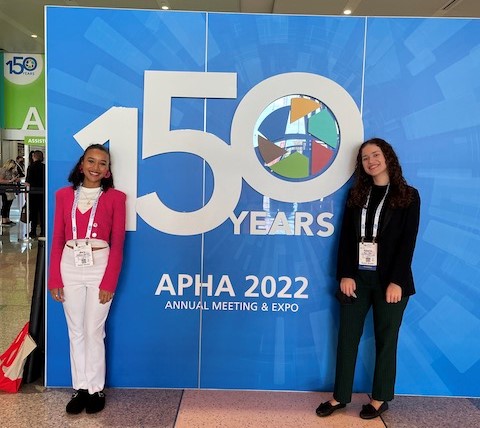
As one of only 10 fellows selected, Stein Elger traveled to the APHA annual meeting and took part in trainings, meetings and presentations. She also participated in MCH leadership skills development training.
“The fellowship provides an opportunity to improve my professional experiences by allowing me to participate in initiatives related to professional education and policy,” said Stein Elger, who plans to work in MCH research, specifically focusing on children with special health care needs and their experiences accessing services and resources.
Poster presentations
Two COPH students—Chinyere Reid, a PhD student, and Mae Horne, an undergraduate—presented research during the APHA’s prestigious Delta Omega Student Poster Session.
Delta Omega Honorary Society in Public Health, as it’s officially known, began sponsoring the annual Student Poster Session to encourage and recognize the public health leaders of tomorrow. Each year, 29 students from across the country are selected to present their research at the APHA’s annual meeting.
You can read about Horne’s research here.
Reid’s poster focused on virtual training workshops presented to all maternity hospitals in Florida to improve birth data reporting on birth certificates. According to Reid, some common mistakes made on birth certificates are a result of not entering any data (missing data), using incorrect data sources and even asking the patient (mother) for information they are unlikely to correctly report.
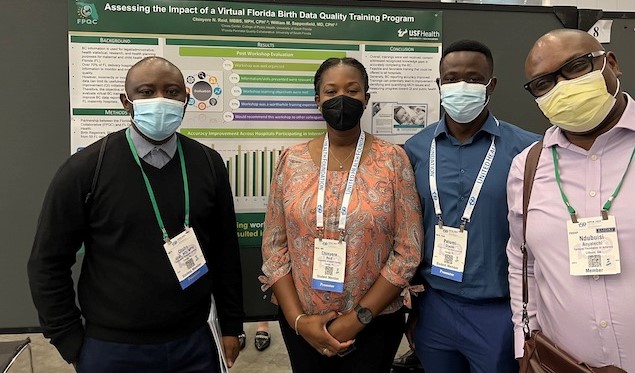
“More than 70 percent of maternity hospitals in Florida utilize birth certificate data to monitor and improve health care quality,” Reid explained. “Therefore, this work will help improve the reporting accuracy of birth certificate data that informs public health surveillance, monitoring, practice, policy and research in maternal and infant health. It was a wonderful experience presenting this work at APHA,” she added, “and a great opportunity to share the important work we at Florida Perinatal Quality Collaborative (FPQC), in collaboration with the Florida Department of Health Vital Statistics, are doing to improve birth certificate data in the state.”
###
After submitting an abstract to the APHA research expo last spring, fourth-year BSPH student Leomar White was selected to present research he conducted on pedestrian-related crashes in Hillsborough County.

“My hypothesis was that median income would be a significant predictor of crash outcome, but that wasn’t the case,” said White, who is also the president of the USF Bicyclist Club. “The two most significant variables were the number of people who walk to work and the number who take public transportation per zip code. Presenting this research was a great way to practice my communication skills and meet people working in my field.”
###
Kayleigh Murray, a senior majoring in both public health and statistics, presented her research focusing on probability model creation and optimization in populations with little variation, such as migrant farmworkers. (She is also a coauthor on White’s poster.)
“Most studied populations in public health have large variation, but there are some that do not,” Murray explained. “This can be due to the type of data collected on the population or the availability of data. Farmworkers are one population where data, especially public data, is very hard to find and gather. However, I still wanted to show that it can be possible to create an accurate probability model with the little data available on populations like migrant farmworkers. I was both excited and nervous to present the research—it was my first time presenting (and going to) such a large event!”
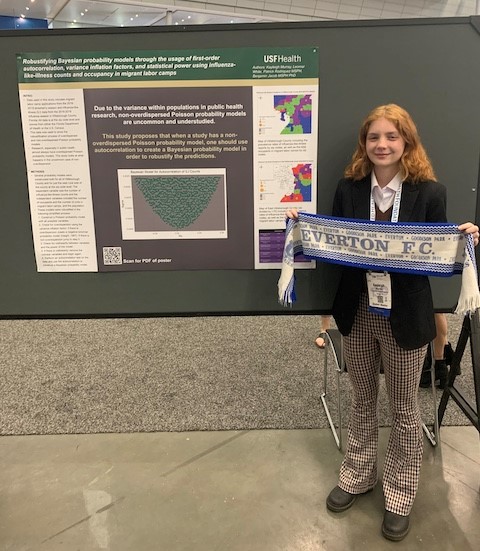
Awards
PhD student Hunter Drake received an acknowledgment award and a $500 stipend for his work as one of the APHA’s inaugural Susan L. Fulmer HIV/AIDS Section Fellows. The fellowship provides support to students and early-career professional section members who seek to engage in a yearlong intensive, competitive research skills development program.
Mentorship is a foundational component of the HIV/AIDS Section Fellowship. Drake was paired with Dr. Stephanie Marhefka who mentored him through the process of designing a mixed-methods DELPHI study to explore best practices for HIV-related stigma reduction in healthcare settings.
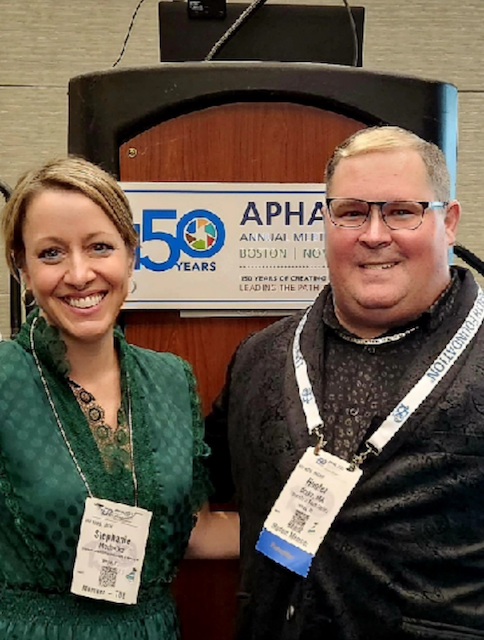
“As a researcher and student living with HIV, this award means so much to me because it shows that APHA cares about the meaningful involvement of people living with HIV in research and academics,” Drake said. “The fellowship provided space and structure for me to finish the concept paper for my doctoral program and design the study I wish to conduct.”
Networking
Students from across the college came together at APHA to meet, mingle and investigate career opportunities.
“APHA was a great event to network and discover what was happening in the current public health sphere. It was so enriching,” said senior BSPH student Micah Garcia. “I want to go to graduate school for an MPH next fall and being able to talk one-on-one and in person with the admission coordinators was one of the most fulfilling experiences at the conference. Although I was nervous about being overwhelmed with the number of people I would interact with, I am very happy I attended this year and believe it was extremely beneficial to my public health interests!”

“It’s been really empowering to see all of the students and the research projects being done,” added Emily Walsh, a third-year undergraduate and student director of the COPH Health Scholars Program. “There’s always something new to see everywhere you go. Attending the conference has helped give me a better idea of what my future could look like in this field.”
And, finally, fun!
The year was 2019 and the location was Lucky Strike in Philadelphia. That was the last time the COPH gathered for the annual reception in conjunction with the APHA annual meeting.
Fast forward to 2022 and the college more than made up for lost time. Boston served up lovely temperatures for an indoor/outdoor reception. More than 125 members of the college and its supporters attended the comeback event on Monday, Nov. 7.
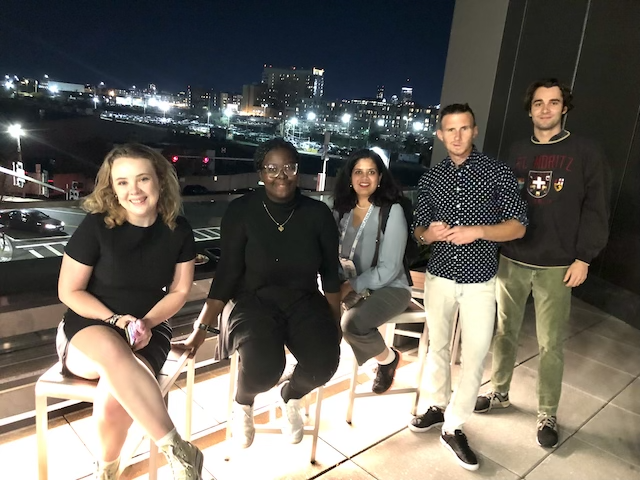
Dean Donna Petersen welcomed attendees and highlighted why the college is known for hosting one of the best receptions during APHA. She gave a shout-out to students, faculty, staff, alumni and friends of the college and declared, “Our people are what makes this a spectacular event!”
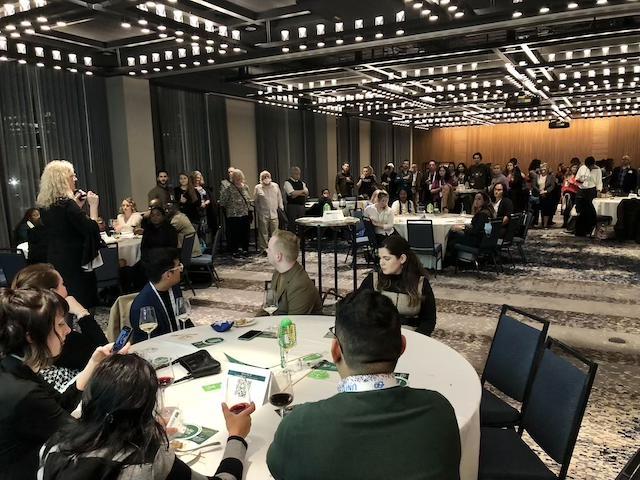
The reception’s call to action centered around a new Strive for 25 initiative, led by the COPH Alumni Society. After viewing a short video, the dean and Beth Ahmedic, COPH development officer, urged attendees to donate $25 or more to support the next generation of public health professionals.
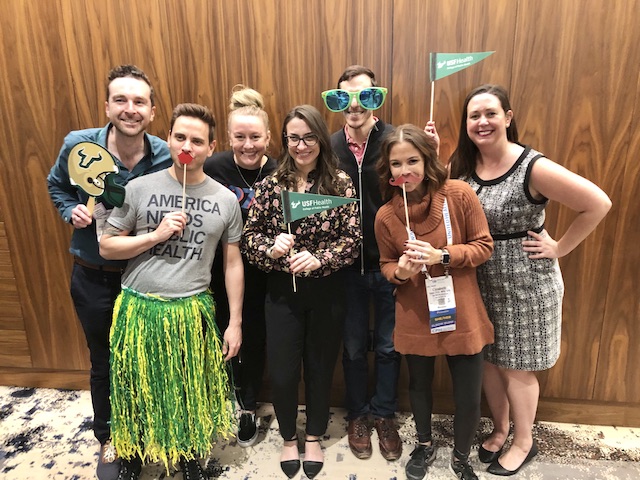
“If 25 percent of our alumni donate $25 to the COPH Alumni Society Endowed Scholarship Fund, then the account will reach an endowment level of $25,000. This will allow the fund to continue in perpetuity, meaning year after year, a USF public health student will be awarded this coveted scholarship,” Ahmedic said.
For more pictures of the COPH at APHA, click here.
Story by Donna Campisano, USF College of Public Health
